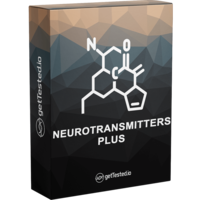Description
What are neurotransmitters ? Acute or chronic stress – whether it is physical or mental – can affect the balance of our neurotransmitters. Neurotransmitters are molecules that transmit nerve signals between nerve cells in our nervous system. Neurotransmitters are important for our behaviour and emotions. Studies have shown that depression is linked to the levels of our neurotransmitters. This test measures GABA, glutamic acid, serotonin, dopamine, epinephrine and norepinephrine . GABA GABA (Gamma Amino Butyric Acid) is the most important inhibitory neurotransmitter in our central nervous system. GABA reduces our stress response and is needed for a good sleep, to regulate appetite, blood pressure and to reduce anxiety. GABA is synthesised by glutamic acid. GABA has a calming and relaxing effect and can reduce epileptic activity. Getting adequate sleep is one of the most important things for us to be able to recover and any imbalances in the levels of GABA can thus affect our well-being. If you are low on GABA, it is available as a supplement. Glutamic acid / Glutamate Glutamic acid / glutamate (not to be confused with the amino acid glutamine) is important for our cognitive ability, learning, memory and motor skills. It is the most important excitatory neurotransmitter and the neurotransmitter found in the largest amount in our brain. Glutamate is needed for the nerve signals between the cells to pass. During prolonged stress, glutamic acid is often elevated. Many people think of glutamate as a food additive and glutamate is found naturally in meat, vegetables, wheat and soy and is used as a food additive to enhance the taste. Serotonin Serotonin is an important neurotransmitter for our general well-being and is a precursor to melatonin that is needed for our sleep, as well as an antagonist to cortisol. It is best known for its effect on our mood, but serotonin also has a positive effect on sleep, peristalsis, appetite and blood pressure. Anxiety suppressant Antidepressant Mood-raising Relaxing Sleep regulators Appetite regulator Low levels are associated with, for example, obesity, depression, anxiety, insomnia, compulsive obsessive behaviour and migraines. Stress affects the levels of serotonin. During acute stress, serotonin levels rise at first, but with prolonged stress, less and less serotonin is produced at the same time as the body uses more serotonin, which means that the levels decrease. Dopamine Dopamine is needed for our drive and motivation, concentration and our cognitive ability. Dopamine is part of our reward system and is known as the feel-good hormone. Low levels can make us feel unmotivated and depressed. Serotonin has also been linked to restless legs, impaired motor skills, obsessive compulsive and addictive behaviour. In Parkinson’s disease, the nerve cells that produce dopamine die, which leads to the tremors that occur with the disease. Excessive levels of dopamine can lead to memory loss, anxiety, hyperactivity and mood swings. There is a direct link between addiction and imbalance in the dopamine levels. Adrenaline Adrenaline, also called epinephrine, is produced in the adrenal medulla and affects our mental activity, heart rate and blood pressure. Threatening and stressful situations can trigger the secretion of adrenaline. Noradrenaline The general function of noradrenaline, also called norepinephrine, is to mobilise the brain and body for action. It increases blood pressure and, together with dopamine, has a positive effect on motivation, concentration and motor skills. Norepinephrine increases with stress and is a precursor to adrenaline How does the test work? The Neurotransmitters Plus is a urine test which is done at home. You collect the sample from your second morning urine and put it in a test tube, then send it to our ISO certified lab for analysis. You will receive your test result digitally as soon as our lab has analysed your sample.


